 Why I chose Pitt: There were several reasons that Pitt was my top choice for genetic counseling programs. I explored public health during my undergraduate career and was immensely interested in applying population health concepts to healthcare, including genetic counseling. Having the program housed within the School of Public Health means that public health concepts are continuously emerging in our classes, and I was excited to learn about genetic counseling through that lens. I'm also pursuing the dual degree in genetic counseling and public health genetics because of this excitement and desire to take my public health education a bit further as well. I was additionally excited about the confidence-building model offered at Pitt. Most genetic counseling programs don't give you the opportunity to take almost all of your classes prior to starting clinical rotations. Being able to have a firm knowledge base prior to delving into the clinical aspect was really appealing to me because I really enjoy being as prepared as possible. Pitt felt like the perfect program for me on a personal and academic level!
Why I chose Pitt: There were several reasons that Pitt was my top choice for genetic counseling programs. I explored public health during my undergraduate career and was immensely interested in applying population health concepts to healthcare, including genetic counseling. Having the program housed within the School of Public Health means that public health concepts are continuously emerging in our classes, and I was excited to learn about genetic counseling through that lens. I'm also pursuing the dual degree in genetic counseling and public health genetics because of this excitement and desire to take my public health education a bit further as well. I was additionally excited about the confidence-building model offered at Pitt. Most genetic counseling programs don't give you the opportunity to take almost all of your classes prior to starting clinical rotations. Being able to have a firm knowledge base prior to delving into the clinical aspect was really appealing to me because I really enjoy being as prepared as possible. Pitt felt like the perfect program for me on a personal and academic level!
Background: Compassion counselor (Chronic Illness Hotline); research assistant and volunteer (Sanders-Brown Center on Aging Alzheimer’s Disease Center, University of Kentucky); medical transcriptionist for an orthopedic surgeon (Nuance); trained active listener (7 Cups of Tea)
Ariel Breeze (BS biology with minor in psychology, University of Kentucky, 2019)
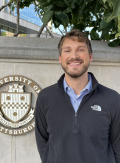 Why I chose Pitt: As a returning student with a few gap years, I favored the Pitt MSGC academic layout over other programs. Starting the year made up primarily of classes and coursework would allow me to dust off my study habits and focus my efforts. In addition to this structural fit, I had family members and close friends living nearby. With surrounding support systems, all within the realm of the wonderful city of Pittsburgh, my decision to join Pitt was solidified. Support comes from within the program as well, having a team of fellow students and faculty members that genuinely care about your mental health as well as your progression. As a current dual degree-seeking student, the uniqueness of the public health genetics degree also caught my eye, offering additional perspectives on the growing field of genetics and genetic counseling.
Why I chose Pitt: As a returning student with a few gap years, I favored the Pitt MSGC academic layout over other programs. Starting the year made up primarily of classes and coursework would allow me to dust off my study habits and focus my efforts. In addition to this structural fit, I had family members and close friends living nearby. With surrounding support systems, all within the realm of the wonderful city of Pittsburgh, my decision to join Pitt was solidified. Support comes from within the program as well, having a team of fellow students and faculty members that genuinely care about your mental health as well as your progression. As a current dual degree-seeking student, the uniqueness of the public health genetics degree also caught my eye, offering additional perspectives on the growing field of genetics and genetic counseling.
Background: Cancer Genetic Counseling Assistant (Geisinger Medical Center, Danville, PA); Certified Health Research Assistant (MyCode Community Health Initiative, Danville, PA)
Daniel Brennsteiner (BS biology with minor in chemistry, University of Pittsburgh at Johnstown, 2015)
 Why I chose Pitt: I knew that the Genetic Counseling program at Pitt would be a perfect fit for me because it encompassed everything that I was hoping to find in a graduate school. The program fosters a collaborative environment that provides constant support and mentorship from the directors, local genetic counselors, and other individuals within the department of Human Genetics. The medical community associated with Pitt is something that I am excited to be part of. The diversity of the healthcare systems in the area allows for increased opportunities for involvement and exposure to the field. I appreciate the value Pitt places on a well-rounded education through the emphasis on public health, and having the ability to work with students outside the program. As a Pitt alum, I couldn’t be happier to be back home.
Why I chose Pitt: I knew that the Genetic Counseling program at Pitt would be a perfect fit for me because it encompassed everything that I was hoping to find in a graduate school. The program fosters a collaborative environment that provides constant support and mentorship from the directors, local genetic counselors, and other individuals within the department of Human Genetics. The medical community associated with Pitt is something that I am excited to be part of. The diversity of the healthcare systems in the area allows for increased opportunities for involvement and exposure to the field. I appreciate the value Pitt places on a well-rounded education through the emphasis on public health, and having the ability to work with students outside the program. As a Pitt alum, I couldn’t be happier to be back home.
Background: Genetic Counseling Assistant (Hospital of the University of Pennsylvania, Neurology); Neurogenetics Research Coordinator (Hospital of the University of Pennsylvania, Neurology); Crisis Counselor (Crisis Text Line)
Work Position: Genetic Counseling Assistant, UPMC Eye Center
Morgan Brzozowski (BS biological sciences, double major in psychology, minor in chemistry, University of Pittsburgh, 2019)
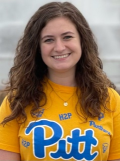 Why I chose Pitt: From the time I began considering genetic counseling, I was always intrigued by the dual degree option at Pitt. Not only is the program housed in the School of Public Health, but there is a clear pathway for students who wish to explore public health further through the dual degree. Knowing that both my interest in genetic counseling and my interest in health, as it relates to literacy, could be nurtured at Pitt kept the program high on my list. When I started in the MPH program in fall 2020, I was immediately blown away by the welcoming atmosphere that Pitt provided—not only in my department, but across the university. I quickly became accustomed to the culture of support and understanding here and knew that there was no other place I would want to continue my education to become a genetic counselor. As a dual degree student now, I am still in awe of the way all of my faculty promote my success and confidence over anything else.
Why I chose Pitt: From the time I began considering genetic counseling, I was always intrigued by the dual degree option at Pitt. Not only is the program housed in the School of Public Health, but there is a clear pathway for students who wish to explore public health further through the dual degree. Knowing that both my interest in genetic counseling and my interest in health, as it relates to literacy, could be nurtured at Pitt kept the program high on my list. When I started in the MPH program in fall 2020, I was immediately blown away by the welcoming atmosphere that Pitt provided—not only in my department, but across the university. I quickly became accustomed to the culture of support and understanding here and knew that there was no other place I would want to continue my education to become a genetic counselor. As a dual degree student now, I am still in awe of the way all of my faculty promote my success and confidence over anything else.
Background: Volunteer Crisis Counselor (Crisis Text Line); Undergraduate Teaching Assistant (Biology Department, Penn State); Undergraduate Research Assistant (Hanna-Rose Lab, Penn State); President (Science LionPride, Penn State); Peer Buddy (Communicating through Performance, Penn State); Graduate Student Representative (Nondiscrimination, Equal Opportunity, and Affirmative Action Policy Committee, Pitt); Tutor (Student Athletic Academic Services, Pitt)
Work Position: Research Assistant with UPMC Shadyside Nursing Education and Research
Madalyn Charnego (BS biology - genetics and developmental biology with a minor in deafness and hearing studies, Pennsylvania State University, 2020)
 Why I chose Pitt: I was initially drawn to Pitt’s program because it’s housed within a university with an excellent reputation for clinical research and a city known worldwide for its health systems. I was excited by the wide breadth and accessibility of Pitt’s clinical rotations, and was particularly interested in their more unique rotations like primary care. Pitt’s program being positioned within the School of Public Health was another huge draw for me, since it encourages interdisciplinary collaboration and infuses a valuable public health perspective into the GC curriculum. When I spoke with faculty and students during my interview, I could immediately tell that Pitt fosters an encouraging and supportive environment that I wanted to be a part of. It was clear to me that the program truly prioritizes developing confident, capable, and compassionate genetic counselors. Pitt’s dedication to their students, combined with the fact that Pittsburgh is such a fun and livable city, made the program the obvious choice for me. I’m so excited to be a part of this amazing community at Pitt and begin my training in the lovely city of Pittsburgh!
Why I chose Pitt: I was initially drawn to Pitt’s program because it’s housed within a university with an excellent reputation for clinical research and a city known worldwide for its health systems. I was excited by the wide breadth and accessibility of Pitt’s clinical rotations, and was particularly interested in their more unique rotations like primary care. Pitt’s program being positioned within the School of Public Health was another huge draw for me, since it encourages interdisciplinary collaboration and infuses a valuable public health perspective into the GC curriculum. When I spoke with faculty and students during my interview, I could immediately tell that Pitt fosters an encouraging and supportive environment that I wanted to be a part of. It was clear to me that the program truly prioritizes developing confident, capable, and compassionate genetic counselors. Pitt’s dedication to their students, combined with the fact that Pittsburgh is such a fun and livable city, made the program the obvious choice for me. I’m so excited to be a part of this amazing community at Pitt and begin my training in the lovely city of Pittsburgh!
Background: Genetic Counseling Shadowing (Geisinger Medical Center); Undergraduate Research Assistant (Anthropological Genomics Laboratory, Penn State and Bollinger-Krebs Bioinorganic Chemistry Laboratory, Penn State); Undergraduate Teaching Assistant (Introductory Microbiology Laboratory, Penn State); Caring Hospice Volunteer (Lancaster, PA); Crisis Center North Crisis Hotline and Text Line Volunteer (Pittsburgh, PA); Science Writer (Getson & Schatz Immigration Law Firm)
Work Position: Genetic Counseling Assistant at UPMC Hereditary GI Tumor Program
Kate Cioffi (BS in biochemistry and molecular biology, biochemistry option, Penn State University, 2019)
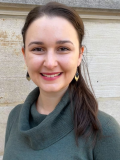 Why I chose Pitt: Pittsburgh has been my US home since moving from Australia and I was thrilled to find out that the country’s second oldest genetic counseling program was just down the road. When I met with staff, students, and alumni from the Pitt program, I had such positive experiences, everyone was so welcoming and encouraging of my journey to be genetic counselor and all had such great things to say about the program. After these interactions, plus speaking with GCs in the Pittsburgh region who are clinical supervisors, I knew that Pitt was the perfect place for my education and development as a GC. The Pitt program also has so many clinical opportunities within close reach of the city limits, as well as the possibility to do a rotation abroad, both of which made me even more pleased to apply to the program. I am incredibly excited to begin my genetic counseling career as a Pitt student.
Why I chose Pitt: Pittsburgh has been my US home since moving from Australia and I was thrilled to find out that the country’s second oldest genetic counseling program was just down the road. When I met with staff, students, and alumni from the Pitt program, I had such positive experiences, everyone was so welcoming and encouraging of my journey to be genetic counselor and all had such great things to say about the program. After these interactions, plus speaking with GCs in the Pittsburgh region who are clinical supervisors, I knew that Pitt was the perfect place for my education and development as a GC. The Pitt program also has so many clinical opportunities within close reach of the city limits, as well as the possibility to do a rotation abroad, both of which made me even more pleased to apply to the program. I am incredibly excited to begin my genetic counseling career as a Pitt student.
Background: Client Relations Manager & Florist (Allison McGeary Florist); Genetic Services Committee Member (PAGC); Next Chapter Book Club Volunteer (Carnegie Library East Liberty); Library Volunteer (Carnegie Library Squirrel Hill); Dress for Success Volunteer (Allegheny Branch); Webinar Coordinator (Queensland Education Science Technicians); Scientific Operations Officer (Pittsworth State High School); Secretary & Newsletter Editor (Golden Key Executive Committee at USQ); Peer-to-Peer Tutor (USQ); Demonstrator Assistant (USQ); Summer Research Scholar (Australian National University)
Lucy Galea (BS environment & sustainability, 2013 & BS Honors biology, 2014, University of Southern Queensland)
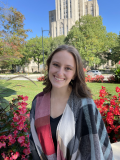 Why I chose Pitt: I had the pleasure of attending Pitt for my undergraduate career and I fell in love with the university and the city. When applying to graduate school I knew I wanted to come back to Pitt for a multitude of reasons. In working with the genetic counseling club, I was able to see the supportive environment fostered by the genetic counseling program directors and the genetic counselors in the city. Another major contributor to my decision is students’ ability to receive a dual degree in public health genetics. Through the dual degree program, I am able to learn additional skills which help foster my passion for equity in access to genetic services and community engagement. Unlike most programs Pitt has a primary care clinical rotation. I am excited to see how this will incorporate into the field of precision medicine, a forefront of clinical care in which genetic counselors will play an integral role. The ability to have a work position throughout my schooling was important for me and Pitt always emphasized their support for working students. The supportive environment and diverse opportunities are why I choose Pitt.
Why I chose Pitt: I had the pleasure of attending Pitt for my undergraduate career and I fell in love with the university and the city. When applying to graduate school I knew I wanted to come back to Pitt for a multitude of reasons. In working with the genetic counseling club, I was able to see the supportive environment fostered by the genetic counseling program directors and the genetic counselors in the city. Another major contributor to my decision is students’ ability to receive a dual degree in public health genetics. Through the dual degree program, I am able to learn additional skills which help foster my passion for equity in access to genetic services and community engagement. Unlike most programs Pitt has a primary care clinical rotation. I am excited to see how this will incorporate into the field of precision medicine, a forefront of clinical care in which genetic counselors will play an integral role. The ability to have a work position throughout my schooling was important for me and Pitt always emphasized their support for working students. The supportive environment and diverse opportunities are why I choose Pitt.
Background: Intake Coordinator (Specialized Therapy Associates); Evaluator (Collaborative for Evaluation and Assessment Capacity); Sexual Assault Crisis Line Volunteer (Pittsburgh Action Against Rape); President and Volunteer Coordinator (Pitt Genetic Counseling Club); Browne Fellowship (University of Pittsburgh, School of Social Work)
Work Position: Clinical Research Intern, Therapeutic Research in Neuromuscular Disorder Solutions (TRiNDS)
Carolyn Maxwell (BS biological sciences with minor in chemistry, Certificate Conceptual Foundations of Medicine, University of Pittsburgh, 2020)
 Why I chose Pitt: Beyond being drawn to Pitt’s reputation for all-around excellence in education, I was specifically drawn to the Genetic Counseling Program for its goal of fostering leaders in science and health care through the study and understanding of genomic information. I was also pleased to discover that Pitt’s Genetic Counseling Program is housed within the Graduate School of Public Health. Not only does this provide students with the unique opportunity to customize their education and pursue a dual degree in Genetic Counseling and Public Health, but it ensures both curriculums contribute to an overarching goal of health equity for everyone—something very important to my personal and professional values.
Why I chose Pitt: Beyond being drawn to Pitt’s reputation for all-around excellence in education, I was specifically drawn to the Genetic Counseling Program for its goal of fostering leaders in science and health care through the study and understanding of genomic information. I was also pleased to discover that Pitt’s Genetic Counseling Program is housed within the Graduate School of Public Health. Not only does this provide students with the unique opportunity to customize their education and pursue a dual degree in Genetic Counseling and Public Health, but it ensures both curriculums contribute to an overarching goal of health equity for everyone—something very important to my personal and professional values.
Background: Registered Nurse with positions in Public Health, Reproductive Health and Pediatric Metabolism and Genetics, Victim Services Certified Advocate; Volunteer (Ronald McDonald House); Peer Educator (Center for Alcohol Studies and Education, University of Wisconsin-Eau Claire)
Glenna Noska (BS nursing, University of Wisconsin-Eau Claire, 2013)
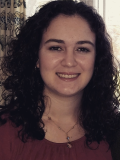 Why I chose Pitt: Pitt’s program stuck out to me from when I first learned about genetic counseling. I became familiar with the program as an undergraduate student at Pitt through the genetic counseling club, where I heard from first- and second-year students about their experiences in the program. They all seemed so close with one another, which was very important to me. The program leadership seemed very supportive of the students as well. I also got the chance to work with Pitt alumni and see how well the program prepared them for their jobs. Additionally, our coursework is concentrated in the first year, which is my personal learning preference. Because we are so focused in clinical rotations in our second year, I think this will help with translating our skills into the workforce once we graduate. It is also great that students get to experience both of the fantastic hospital systems in Pittsburgh to see how different hospitals and specialties within hospitals are run on the clinical side and how operations in whole hospital systems can differ. The public health focus of Pitt’s program is also unique, and the program gives you a very relevant perspective of the field no matter whether or not you choose to add a dual degree or a certificate. Pittsburgh has also been an amazing place to live and has so much to offer, from the restaurant and bar scene to all of the sporting events and the unique neighborhoods to explore. I am so excited to spend two more years here!
Why I chose Pitt: Pitt’s program stuck out to me from when I first learned about genetic counseling. I became familiar with the program as an undergraduate student at Pitt through the genetic counseling club, where I heard from first- and second-year students about their experiences in the program. They all seemed so close with one another, which was very important to me. The program leadership seemed very supportive of the students as well. I also got the chance to work with Pitt alumni and see how well the program prepared them for their jobs. Additionally, our coursework is concentrated in the first year, which is my personal learning preference. Because we are so focused in clinical rotations in our second year, I think this will help with translating our skills into the workforce once we graduate. It is also great that students get to experience both of the fantastic hospital systems in Pittsburgh to see how different hospitals and specialties within hospitals are run on the clinical side and how operations in whole hospital systems can differ. The public health focus of Pitt’s program is also unique, and the program gives you a very relevant perspective of the field no matter whether or not you choose to add a dual degree or a certificate. Pittsburgh has also been an amazing place to live and has so much to offer, from the restaurant and bar scene to all of the sporting events and the unique neighborhoods to explore. I am so excited to spend two more years here!
Background: Genetic Counselor Assistant (Nationwide Children's Hospital); Laboratory Genetic Testing Utilization Management Student Worker at (UPMC Children's Hospital of Pittsburgh); GC Shadowing (Nemours A.I. DuPont Hospital for Children and Children’s Hospital of Philadelphia); Peer Educator at the Stress Free Zone (University of Pittsburgh); volunteer at Family House (Pittsburgh, PA); "Big Sister" (Big Brothers Big Sisters of Greater Pittsburgh); undergraduate teaching assistant for Introduction to Microbiology Lab (University of Pittsburgh); undergraduate research assistant (Department of Psychiatry, University of Pittsburgh); Vice President of University of Pittsburgh Student Health Advisory Board, Genetic Counseling Club (University of Pittsburgh)
Rebecca Oberschmidt (BS biological sciences, minor in chemistry, University of Pittsburgh, 2020)
 Why I chose Pitt: I chose Pitt because of its intersection between genetic counseling and public health. Both are imperative to providing effective counseling and will help drive the future of public health genetics. Making sure we are all trained on not only the basics of genetic counseling but keeping us up to date on all DEIA initiatives and maintaining an open and supportive environment for learning and growth. Additionally, the program and program leadership are very supportive of all of their students and strive to ensure that our wellbeing is taken care of, along with our education. I know that being a part of this program will not only set me up for success in my future as a genetic counselor but also has provided me with a supportive and great community.
Why I chose Pitt: I chose Pitt because of its intersection between genetic counseling and public health. Both are imperative to providing effective counseling and will help drive the future of public health genetics. Making sure we are all trained on not only the basics of genetic counseling but keeping us up to date on all DEIA initiatives and maintaining an open and supportive environment for learning and growth. Additionally, the program and program leadership are very supportive of all of their students and strive to ensure that our wellbeing is taken care of, along with our education. I know that being a part of this program will not only set me up for success in my future as a genetic counselor but also has provided me with a supportive and great community.
Background: Project Sunshine DC chapter; Aquatic Therapeutic Recreation for Montgomery County; Business Manager/Administrator (Pitt Public Health Student Government Association)
Work Position: Genetic Counseling Assistant, Program Assistant for GeneDx
Samantha Runa (BS biology with minor in chemistry and political science, Oregon State University, 2016)
 Why I chose Pitt: As I was researching genetic counseling programs, Pitt’s program had several factors that stood out to me. I was drawn to Pitt’s program for its confidence building model. I liked how most of the courses are completed in the first year, so that students have a solid foundation going into clinical rotations during the second year. With the program housed in the Graduate School of Public Health, getting to learn through a public health perspective was also something that I found unique. In addition, Pitt has such an established program with welcoming faculty and an extensive alumni network, so I felt that I would be well supported throughout the two years of the program. Outside of the program, Pittsburgh is a fun city to explore with its vibrant neighborhoods, scenic parks, and great restaurants!
Why I chose Pitt: As I was researching genetic counseling programs, Pitt’s program had several factors that stood out to me. I was drawn to Pitt’s program for its confidence building model. I liked how most of the courses are completed in the first year, so that students have a solid foundation going into clinical rotations during the second year. With the program housed in the Graduate School of Public Health, getting to learn through a public health perspective was also something that I found unique. In addition, Pitt has such an established program with welcoming faculty and an extensive alumni network, so I felt that I would be well supported throughout the two years of the program. Outside of the program, Pittsburgh is a fun city to explore with its vibrant neighborhoods, scenic parks, and great restaurants!
Background: Clinical Data Manager (Comprehensive Research Solutions, Bethesda, MD); Clinical and Research postbaccalaureate fellow (National Cancer Institute); Summer research intern (National Cancer Institute); Volunteer (The Trevor Project); Undergraduate Teaching Assistant: Psychology of Women (University of Maryland); University Honors Peer Mentor (University of Maryland)
Impana Shetty (BS cell biology & genetics, BS psychology, University of Maryland College Park, 2017)
 Why I chose Pitt: My decision to apply to Pitt was informed by my mentors and my experience working in Pittsburgh. I moved from Texas to Pittsburgh for a position as a genetic counselor assistant and Pittsburgh quickly became my new home. The genetics community here is set on helping students succeed and the local community is equally as generous. In addition, the opportunity to work towards a Masters of Public Health was an opportunity that I did not want to miss out on as I greatly value the impact public health has on medicine. Pittsburgh is a great example of public health working well; students can ride the city buses for free, there are many grocery stores and markets close by, and there are community health clinics within walking distance of many residential areas. The Pitt Public Health and Genetic Counseling programs are well-established and their long withstanding culture of mentorship has helped Pittsburgh stand out as a keystone of medical genetics as a whole. I am very thankful to have a role here!
Why I chose Pitt: My decision to apply to Pitt was informed by my mentors and my experience working in Pittsburgh. I moved from Texas to Pittsburgh for a position as a genetic counselor assistant and Pittsburgh quickly became my new home. The genetics community here is set on helping students succeed and the local community is equally as generous. In addition, the opportunity to work towards a Masters of Public Health was an opportunity that I did not want to miss out on as I greatly value the impact public health has on medicine. Pittsburgh is a great example of public health working well; students can ride the city buses for free, there are many grocery stores and markets close by, and there are community health clinics within walking distance of many residential areas. The Pitt Public Health and Genetic Counseling programs are well-established and their long withstanding culture of mentorship has helped Pittsburgh stand out as a keystone of medical genetics as a whole. I am very thankful to have a role here!
Background: Ronald E. McNair Post-Baccalaureate Scholar (UTSA); McNair Scholar Student Research Intern (UTSA); Medical Humanities Student Organization Co- President (UTSA); Crisis Counseling (Crisis Text Line); Reading Buddy (San Antonio Youth Literacy Group).
Work Position: Genetic Counselor Assistant, UPMC Children’s Hospital of Pittsburgh, Division of Genetic and Genomic Medicine
Elise Williams (BA medical humanities with minor in biology, University of Texas at San Antonio, 2019)